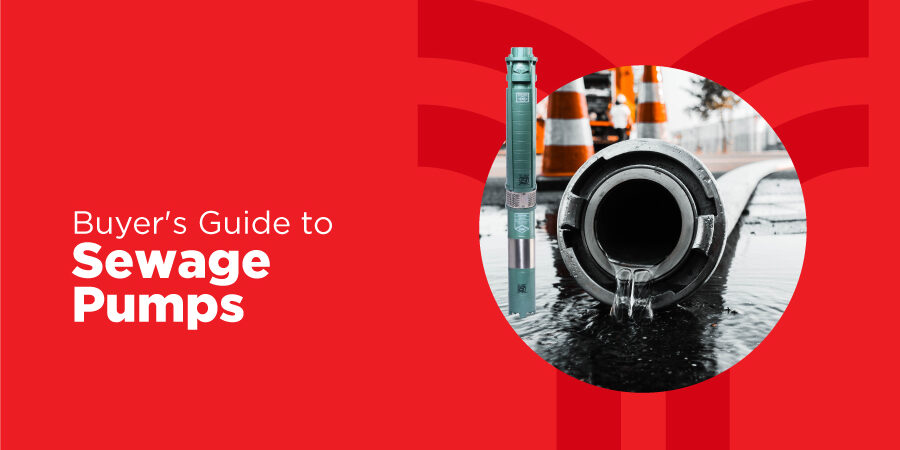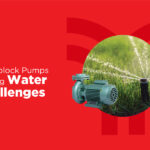Sewage pumps: A guide for buyers
What are sewage pumps? As the term refers, the need to pump out waste water or water containing suspended solids are sewage pumps. This is one of the water pump types which is used for pumping sewage and effluents from bungalows, apartments, public schools, restaurants, hospitals, dewatering trenches and pits, pumping water from docks, ports and vessels, cooling water from marine engines etc. There are two categories based on their configurations and uses which are dry surface pumps and submersible pumps. Let’s discuss how to choose a wastewater pump and tips for consumers.
Which sewage pumps do you need?
Non-clog sewage pumps: It is meant to be used on dry surfaces where they are built-in with a self-priming mechanism. After installation, the pump case is filled initially with the pumped liquid. These kinds of pumps are suitable for the pump out of mud, dirt, and suspended solids and highly suggested for handling water and non-corrosive liquids. According to the principle of diffusion, the self-priming action of the pump works. You can find these suspended solids ranging in size from 7 to 15mm which can be removed using these pumps where you can find either Monoblock type or coupled type.
Submersible dewatering pumps: Long fibres and solid garbage move through these pumps’ semi-open vortex impeller design without coming in contact with the impeller. These kinds of pumps can only clear suspended solids which measure up to 20 mm.
Submersible cutter pumps: These pumps have cutter devices integrated into them that break up solid particles into smaller pieces that may flow via pipes with comparatively small diameters. These pumps are hard to deal with objects like bones, wood, metal, concrete, stones etc. It is easy to install and let it stand freely on the bottom of the pit or suspended with the use of rope.
Tips to buy a sewage pump:
Understand the need for sewage pumps which are critical to assess. Let’s consider factors such as the volume of wastewater generated, the number of fixtures and the distance of the pumps needed to lift the wastewater. Investing in sewage pumps starts with determining the pump capacity, types and features.
Pump capacity: The discharge head of the sewage pump is a key role in determining the performance.
- Do you know what the pump capacity is? It refers to the volume of wastewater which you can handle within the time frame or is usually measured in gallons per minute.
- Choose the pump with a capacity that meets or exceeds the value.
- Consider the discharge head which is the pump’s vertical distance that lifts wastewater to reach and desired discharge point.
- You need to make sure the pump discharge head is similar to your specific requirement which you can avoid system overload.
- To prevent technique overload, make sure the pump’s discharge head satisfies your unique needs.
Construction and materials: Durability is the key to investing in sewage pumps so you need to look for pumps constructed with robust materials to resist the harsh operating conditions of sewage systems.
- The common materials used in sewage pump construction are stainless steel and cast iron which is possible with rust resistance and longevity.
- Other features like the double-sealed motor to protect from water infiltration and increase the lifespan of the pump.
Power and efficiency: In sewage pumps, the motor is the main component which is crucial to consider. It is recommended to choose pumps equipped with high-quality motors which provide reliable and efficient operation.
- Energy-efficient models like Torren Pumps offer low power consumption and save on operating costs in an extended lifetime.
- The use of motors equipped with thermal overload protection is strongly advised, as they safeguard the pump from overheating and potential harm.
Features and considerations: There are various features and considerations you can look for in sewage pumps which are,
- Automatic float switches as they turn on the pump when the wastewater level reaches its point. It is one of the seamless features and does not require human intervention.
- Alarm systems can easily activate the warning signs for likely issues which allows for rapid maintenance and repairs.
- To maintain optimal performance and prevent backflow, check if the pump has a built-in check valve.
- Look for backup power options like battery backups or generators which are essential for providing sewage management even when the power is out.
Customer support and warranty: It is important to consider warranty coverage and customer support when purchasing a sewage pump. Having solid warranty peace of mind and safeguarding ment even if any manufacturing defects or issues. Torren Pumps provides reliable customer support which ensures to access assistance and guidance, even if you need it.
Conclusion: Choosing the right sewage pump is necessary for effective and efficient wastewater management. The above-mentioned tips are for buyers who are looking to invest in sewage pumps. It is better to select the best sewage pumps from the Torren Pumps, a submersible pump manufacturer ensuring reliability and long-lasting performance.


